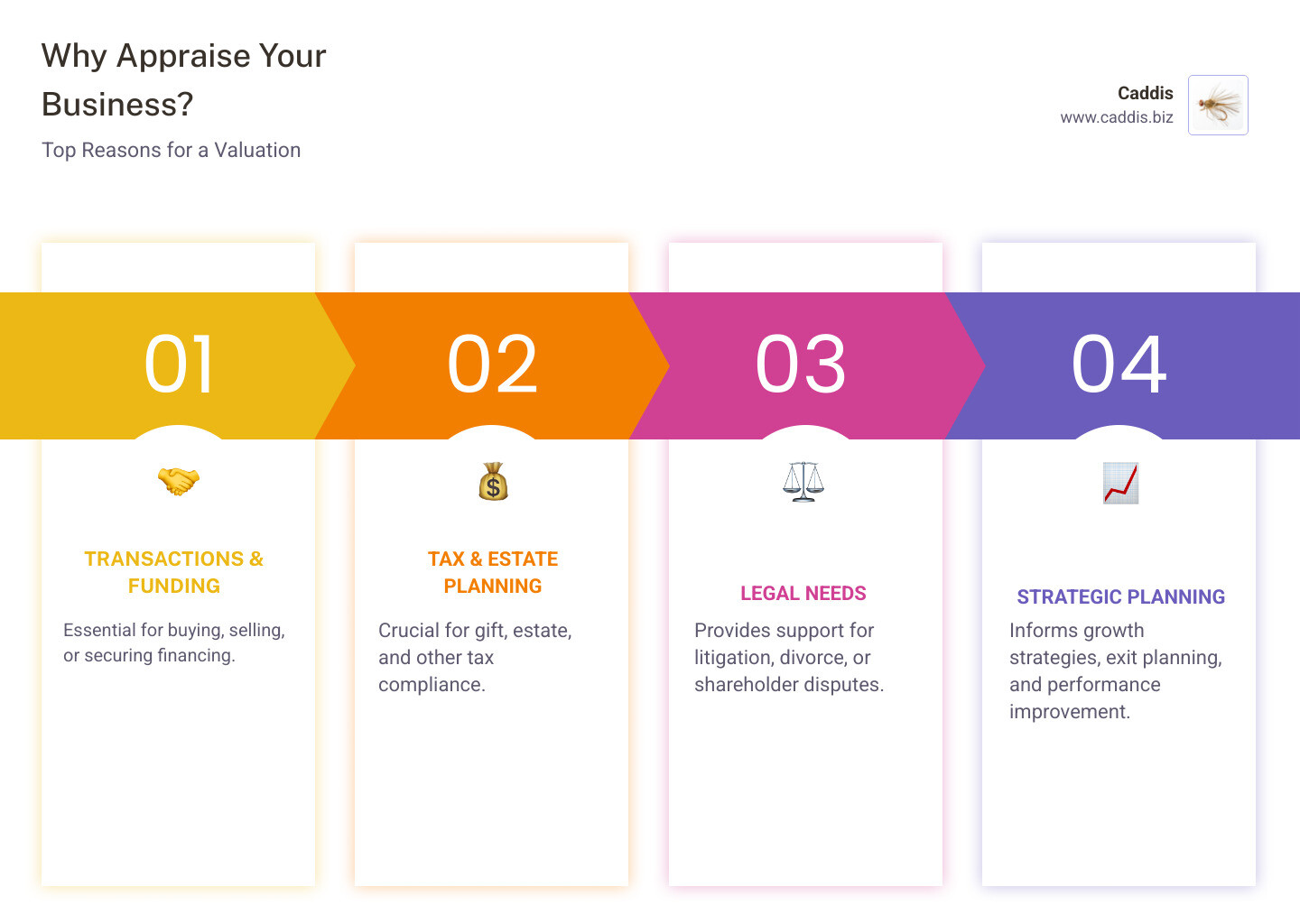Understanding the Role of a Business Appraiser
![business appraiser] – business appraiser](https://images.bannerbear.com/direct/4mGpW3zwpg0ZK0AxQw/requests/000/099/437/382/Klp7yZbnLzXnbAg2Q3jOX9rmG/58984ae1f54af59396dda3c86aae02d1d4e043ed.jpg)
When you’re looking to understand the true worth of your company, a professional business appraiser is your go-to expert. These specialists provide an independent, unbiased opinion of value for businesses of all sizes and types. They are essential for many critical situations.
Here’s why you might need one:
- Buying or Selling a Business: Get a fair price or make an informed offer.
- Tax Purposes: Handle estate and gift taxes correctly.
- Legal Needs: Support litigation, divorces, or shareholder disputes.
- Strategic Planning: Know your company’s value to plan for growth or exit.
- Financing: Secure loans or attract investors.
I’m Jeff Mount, and my experience in strategic and tactical business planning has shown me the critical role a precise business appraiser plays. My approach, honed by adapting to complex challenges, helps businesses not just assess but truly understand their value.

Simple business appraiser glossary:
Decoding the Appraisal: When and Why You Need a Valuation
A business valuation is like a comprehensive health check-up for your company. You shouldn’t wait for a crisis to understand what your business is truly worth. A professional business appraiser provides a clear, defensible opinion of value to guide major decisions and strategic planning.

Understanding your business’s value gives you the confidence to make smart moves, whether you’re planning for growth, preparing for retirement, or navigating unexpected challenges.
Common Scenarios Requiring an Appraisal
Having a solid valuation from a qualified business appraiser can make all the difference in many situations.
Mergers and acquisitions top the list. Whether you’re the buyer or seller, knowing the true value prevents costly mistakes.
Employee Stock Ownership Plans (ESOPs) require valuations by law. This is a legal requirement for transferring ownership to employees that protects everyone involved.
When you’re seeking SBA loans, lenders want proof that your business is worth the investment. A professional appraisal gives them the confidence to approve financing.
Divorce settlements can get messy when a business is involved. An independent valuation removes emotion from the equation and ensures a fair distribution of assets.
For estate and gift taxes, the IRS requires documentation from a certified business appraiser to ensure proper tax compliance. Getting this right can save your family significant money and headaches.
Strategic planning becomes much more effective when you know your starting point. You can’t plan a route without knowing where you are on the map.
Beyond these events, appraisals support buy-sell agreements, resolve shareholder disputes, provide litigation support, ensure tax compliance, and guide succession planning.
The key is not waiting until you’re in crisis mode. For more detailed information about companies specializing in this field, check out Business Valuation Companies.
Understanding What’s Being Valued: Tangible vs. Intangible Assets
When a business appraiser looks at your company, they’re uncovering the full picture of what makes it valuable.
Tangible assets are the physical items you can touch and count, such as your real estate, equipment, inventory, and cash. These are usually straightforward to value.
However, intangible assets often represent the lion’s share of a company’s true worth. These invisible value drivers can make or break your valuation.
Goodwill captures everything that makes your business more valuable than the sum of its parts—your reputation, customer loyalty, employee relationships, and market position.
Your trademarks and brand recognition, copyrights and patents, loyal customer lists, and proprietary processes all contribute to this intangible value. Even your team’s skills and company culture matter.
Many business owners mistakenly think their company’s value is just net profit times an industry multiplier. A qualified business appraiser considers the complete picture—both what you can see and what you can’t.
How Valuation Fuels Strategic Growth
Getting a business appraisal is the beginning of your growth journey. It provides a detailed map showing where you are and where you could go.
The appraisal process often identifies inefficiencies by having an expert examine your operation. These insights alone can be worth the cost of the valuation.
Once you know your business’s worth, you can start maximizing that value. Unlike stocks or real estate, you have direct control over many factors that drive your company’s worth.
Understanding your value drivers helps you focus your efforts where they’ll have the biggest impact, whether it’s increasing revenue or improving profit margins. The valuation shows you where to invest your time and resources.
This knowledge transforms decision-making. Instead of guessing, you can make informed choices about investments and strategic initiatives that align with your value-building goals.
For ongoing success, the insights from your valuation should inform your key performance indicators. Tracking the right metrics ensures your strategic moves are actually moving the needle. Learn more about this in our guide to KPI Tracking for Small Business.
Financial advisors especially benefit from understanding their practice’s valuation for growth and succession planning. Our Financial Advisor Growth Strategies guide dives deeper into these opportunities.
A business valuation gives you the confidence to stop guessing and start growing with purpose.
The Hallmarks of a Top-Tier Business Appraiser
Choosing the right business appraiser is paramount. It’s about finding a professional who embodies expertise, integrity, and objectivity, demonstrated through certifications, experience, and adherence to the highest industry standards.

Key Accreditations and What They Really Mean
Certifications signify a commitment to rigorous training and ethical conduct. Understanding them helps you discern a truly qualified business appraiser.
The ASA (Accredited Senior Appraiser), from the American Society of Appraisers, is a gold standard. It requires a degree, five years of experience, extensive coursework, exams, and a crucial peer review of the appraiser’s work products. Learn more at the American Society of Appraisers (ASA).
The CBA (Certified Business Appraiser) was known for being incredibly difficult to achieve and also required peer review. While no longer awarded, existing designees are highly respected.
The CVA (Certified Valuation Analyst) from the National Association of Certified Valuators and Analysts (NACVA) requires a relevant degree or CPA, an exam, and experience, but it does not include a peer review of the appraiser’s work product. You can explore NACVA’s offerings at the National Association of Certified Valuators and Analysts (NACVA).
The ABV (Accredited in Business Valuation) from the AICPA requires a CPA license and an exam but also does not involve a peer review of valuation reports. The CBI (Certified Business Intermediary) from the IBBA is focused more on brokerage and pricing for sale than formal valuation and also lacks a peer review process.
We prioritize appraisers with demanding, peer-reviewed accreditations like ASA and CBA, as this process signifies a deep commitment to quality and accuracy.
Beyond Certifications: Avoiding Common Pitfalls When Choosing a business appraiser
While certifications are vital, a top-tier business appraiser demonstrates other important qualities. Here’s what to look for:
First, beware of “right-hand appraisers” who skew values to serve an agenda. This is unethical and can have serious legal consequences. Always insist on an independence clause in the appraisal agreement to ensure an unbiased opinion.
Next, consider their industry experience. An appraiser needs experience in your specific field, as industry nuances significantly impact valuation accuracy. Ask about their background with businesses similar to yours.
Always verify references. Contact past clients to inquire about the appraiser’s professionalism, communication, timeliness, and accuracy. A good appraiser will be transparent with their references.
Finally, be cautious of the risks of a low-cost provider. Opting for the cheapest option can be “penny wise and pound foolish.” A low-cost appraisal may lack the depth to hold up in legal or tax matters. Look for full-time professionals whose primary business is appraisal, as they are more dedicated to staying current and providing a higher level of service.
By diligently vetting potential appraisers, you can partner with a truly independent, experienced, and ethical professional.
The Importance of Industry Standards and Regulations
The business appraisal industry is governed by standards designed to ensure accuracy and integrity. Adherence is non-negotiable for any top-tier business appraiser.
Here are the key standards:
USPAP Compliance: The Uniform Standards of Professional Appraisal Practice (USPAP) are the accepted ethics and performance standards for the appraisal profession in the U.S. Compliance ensures the report is prepared ethically and competently. Many designations, like ASA, require it. You can learn more at Learn about USPAP standards.
IRS Qualified Appraiser & Pension Protection Act of 2006: For tax-related valuations, the IRS has specific requirements for who qualifies as an appraiser and what constitutes a qualified appraisal. A competent business appraiser ensures their work complies with these definitions to withstand audits.
NACVA Professional Standards and AICPA Guidelines: These organizations set comprehensive professional standards for their members, guiding the performance of valuation services to ensure care, due diligence, and quality.
These standards are your safeguards. They ensure you receive services that meet an acceptable level of quality, providing a solid foundation for your most important business decisions.
The Appraisal Process: From Preparation to Final Report
Getting a business appraisal can be a smooth process when you work with the right business appraiser and come prepared. Your preparation sets the stage for valuable insights about your company’s worth.

How to Prepare for a Smooth Appraisal Process
Organized documentation makes the appraisal faster and more cost-effective. Here is what you will likely need:
- Financial statements: Three to five years of profit and loss statements, balance sheets, and cash flow statements.
- Tax returns: Federal and state returns for the past three to five years.
- Business plan: Strategic goals, market analysis, and future projections.
- Key contracts: Customer and supplier agreements, leases, and key employment or franchise agreements.
- Organizational documents: Articles of incorporation, bylaws, partnership or LLC operating agreements, and any buy-sell agreements.
- Asset lists: Details of fixed assets (machinery, equipment) and intangible assets (trademarks, patents).
- Historical information: Company history, major milestones, and bios of key management personnel.
- Normalizing adjustments: A list of non-recurring or discretionary expenses (e.g., excessive owner compensation, one-time legal fees) to help the appraiser see the business’s true earning power.
Many appraisers offer a free initial consultation, which can help ensure you’re gathering the right information from the start.
What Factors Influence the Cost of a business appraiser?
Appraisal costs vary based on several factors. Understanding them helps you budget appropriately.
- Project scope: The biggest cost driver. A simple value estimate for internal planning will cost less than a comprehensive opinion of value or a full USPAP-compliant appraisal needed for legal or tax purposes.
- Litigation services: Expert witness testimony and other legal support can escalate costs significantly.
- Business size and complexity: Larger companies with multiple entities or complex operations require more time and expertise.
- Report type: A calculation report based on agreed-upon procedures costs less than a full conclusion of value report.
- Turnaround time: Rush jobs typically carry premium fees.
- On-site visits: Travel and time for site visits and management interviews will factor into the total cost.
- Disorganized records: If the appraiser must spend extra time organizing your information, the cost will increase.
Always get a written quote detailing the scope, deliverables, timeline, and fees before starting.
Understanding the Final Valuation Report
Your final valuation report is a comprehensive document explaining the appraiser’s conclusion.
The report begins by defining the standard of value, most commonly Fair Market Value—the price a willing buyer and seller would agree upon without pressure. It also states the purpose and effective date of the valuation.
The core of the report is the analysis using various valuation approaches:
- Asset Approach: Values the business based on its assets minus liabilities. Best for asset-heavy companies.
- Market Approach: Compares your business to similar companies that have recently sold or are publicly traded.
- Income Approach: Focuses on the business’s ability to generate future earnings, using methods like Discounted Cash Flow.
Top-tier appraisers typically use multiple approaches for a more reliable result. The analysis section details the company’s financials, industry trends, and economic conditions. The conclusion of value presents the appraiser’s final opinion, often as a specific amount or a range.
The report will also state any assumptions and limiting conditions. A quality report should be clear, understandable, and offer actionable insights that transform the appraisal from a compliance document into a roadmap for growth. For more on this, explore our resources on Business Strategy.
Frequently Asked Questions about Business Appraisers
Here are answers to common questions business owners have about the appraisal process.
What’s the difference between a business appraisal and a business valuation?
While the terms are often used interchangeably, they have distinct meanings. Business valuation is a broad term for determining worth, which can range from an informal estimate to a professional assessment. A business appraisal is the formal process conducted by a certified professional following strict standards like USPAP. The result is a detailed, defensible report suitable for legal and tax purposes.
How long does a business appraisal take?
The timeline depends on the project’s scope and complexity. A simple value estimate may take 2-4 business days. A more comprehensive opinion of value typically takes 5-10 business days. A full, USPAP-compliant appraisal for legal or tax purposes can take 8-14 business days or more. The timeline also depends on how quickly you provide the necessary information.
Can I get a valuation for a small, family-owned business?
Yes, and it’s critically important. Research shows family-owned companies often outperform others, making an accurate valuation essential. Appraisals are crucial for succession planning, minimizing estate taxes, establishing buy-sell agreements, and resolving disputes like divorce. A qualified business appraiser understands the unique dynamics of family businesses, such as owner compensation and goodwill, ensuring a fair and objective valuation.
Conclusion: From Valuation to Value Creation
Choosing the right business appraiser is a critical step toward understanding your company’s worth. The valuation is a powerful tool for strategic planning, financing, and shaping your company’s future. By focusing on credentials, objectivity, and experience, you ensure you receive an accurate, defensible assessment.
We’ve covered why you need an appraisal, what’s valued, how to choose a top-tier professional, and what the process entails. This knowledge provides a solid foundation for your most important business decisions.
At Caddis, we believe understanding your value is just the beginning. For financial advisors and business owners eager to not just assess but actively increase their company’s value, we offer strategic growth solutions. We help you turn valuation reports into tangible results, using customized sales strategies and the proven SalesQB framework to help you scale operations and significantly boost your business valuation.
Don’t just guess what your business is worth. Let’s assess it accurately, and then partner together to open up its full potential. Curious to learn more? Learn how a Fractional Chief Revenue Officer can help you grow your business value.

